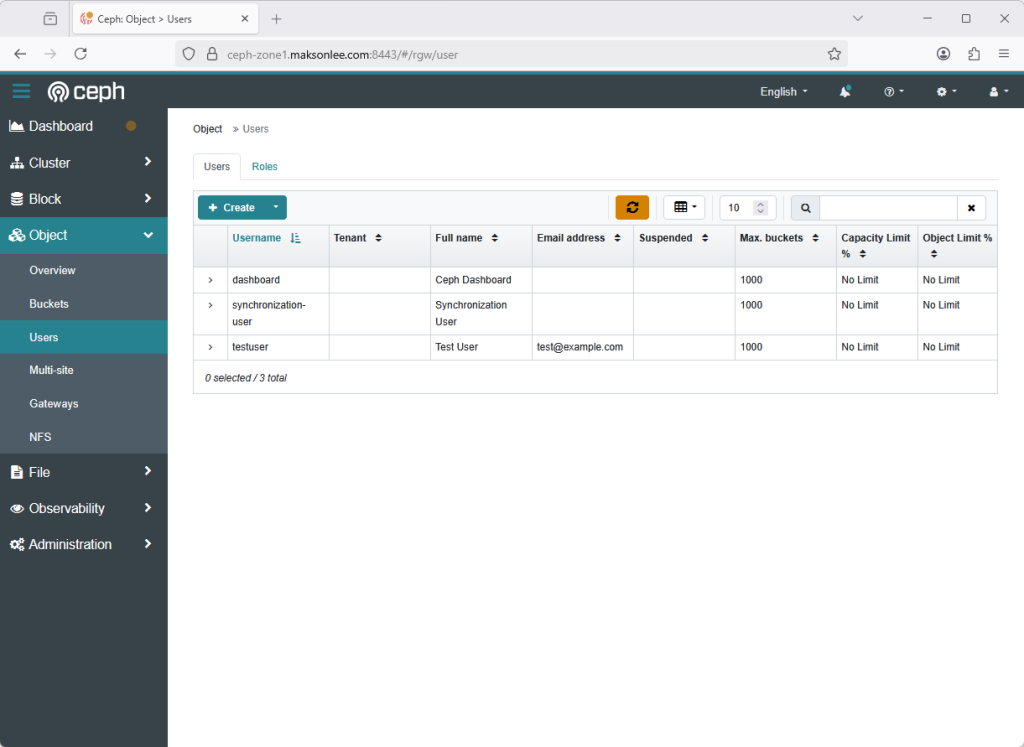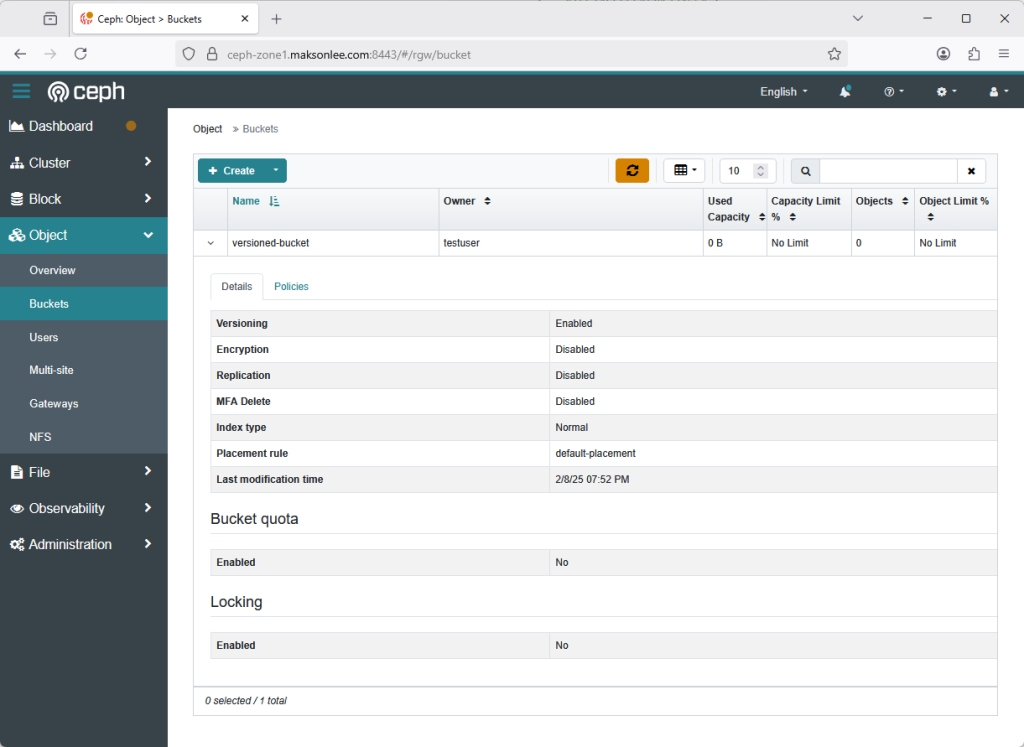Introduction
In the previous post, How to Configure Ceph RGW Multisite with HAProxy and Let’s Encrypt on Ubuntu 24.04, we set up a Ceph RGW multisite deployment with TLS encryption and HAProxy-based routing.
This follow-up covers how to verify that object versioning and replication work as expected across zones by:
- Creating a versioned bucket
- Uploading object versions from different zones
- Verifying version history and default version selection
Prerequisites
- A fully configured Ceph RGW multisite cluster
- Two zones accessible at:
https://ceph-zone1.maksonlee.comhttps://ceph-zone2.maksonlee.com
- Valid TLS certificates via HAProxy + Let’s Encrypt
awscliandjqinstalled
- Create a Test User (on Zone1)
sudo docker exec -it ceph-mon-zone1 radosgw-admin user create \
--uid="testuser" \
--display-name="Test User" \
--email="test@example.com" \
--access-key="TESTACCESSKEY123456" \
--secret="TESTSECRETKEY1234567890"
- Create a Versioned Bucket
Set up your environment:
export AWS_ACCESS_KEY_ID=TESTACCESSKEY123456
export AWS_SECRET_ACCESS_KEY=TESTSECRETKEY1234567890
export AWS_ENDPOINT=https://ceph-zone1.maksonlee.comThen:
aws --endpoint-url $AWS_ENDPOINT s3api create-bucket --bucket versioned-bucket
aws --endpoint-url $AWS_ENDPOINT s3api put-bucket-versioning \
--bucket versioned-bucket \
--versioning-configuration Status=EnabledWait a few seconds for replication to reach zone2.

- Upload Version 1 from Zone1
echo "version1 from zone1" > file.txt
aws --endpoint-url $AWS_ENDPOINT s3 cp file.txt s3://versioned-bucket/file.txt- Upload Version 2 from Zone2
Switch to zone2:
export AWS_ENDPOINT=https://ceph-zone2.maksonlee.com
echo "version2 from zone2" > file.txt
aws --endpoint-url $AWS_ENDPOINT s3 cp file.txt s3://versioned-bucket/file.txt- List Object Versions in Both Zones
export AWS_ENDPOINT=https://ceph-zone1.maksonlee.com
aws --endpoint-url $AWS_ENDPOINT s3api list-object-versions \
--bucket versioned-bucket --prefix file.txt{
"Versions": [
{
"ETag": "\"2de7d20a70570640084e8f757369d289\"",
"Size": 20,
"StorageClass": "STANDARD",
"Key": "file.txt",
"VersionId": "faEJxMq.a2XKRSA5-zRL11-1sZwe1gk",
"IsLatest": true,
"LastModified": "2025-08-02T12:00:34.723000+00:00",
"Owner": {
"DisplayName": "Test User",
"ID": "testuser"
}
},
{
"ETag": "\"adca38cf7cd7a761be684245f1292a36\"",
"Size": 20,
"StorageClass": "STANDARD",
"Key": "file.txt",
"VersionId": "QCePdU8t4MyGjC-cuUSa7ZjNHgL8nbz",
"IsLatest": false,
"LastModified": "2025-08-02T11:54:20.625000+00:00",
"Owner": {
"DisplayName": "Test User",
"ID": "testuser"
}
}
],
"RequestCharged": null,
"Prefix": "file.txt"
}export AWS_ENDPOINT=https://ceph-zone2.maksonlee.com
aws --endpoint-url $AWS_ENDPOINT s3api list-object-versions \
--bucket versioned-bucket --prefix file.txt{
"Versions": [
{
"ETag": "\"2de7d20a70570640084e8f757369d289\"",
"Size": 20,
"StorageClass": "STANDARD",
"Key": "file.txt",
"VersionId": "faEJxMq.a2XKRSA5-zRL11-1sZwe1gk",
"IsLatest": true,
"LastModified": "2025-08-02T12:00:34.723000+00:00",
"Owner": {
"DisplayName": "Test User",
"ID": "testuser"
}
},
{
"ETag": "\"adca38cf7cd7a761be684245f1292a36\"",
"Size": 20,
"StorageClass": "STANDARD",
"Key": "file.txt",
"VersionId": "QCePdU8t4MyGjC-cuUSa7ZjNHgL8nbz",
"IsLatest": false,
"LastModified": "2025-08-02T11:54:20.625000+00:00",
"Owner": {
"DisplayName": "Test User",
"ID": "testuser"
}
}
],
"RequestCharged": null,
"Prefix": "file.txt"
}- What is the Default Version?
In each zone, Ceph RGW treats the last written or replicated version as the default — the one you get when calling get-object without a version ID.
| Zone | Default version immediately after upload |
|---|---|
| Zone1 | v1 (until v2 syncs in) |
| Zone2 | v2 (written locally) |
Eventually, both zones will return v2.
Check It:
export AWS_ENDPOINT=https://ceph-zone1.maksonlee.com
aws --endpoint-url $AWS_ENDPOINT s3 cp s3://versioned-bucket/file.txt file_zone1.txtdownload: s3://versioned-bucket/file.txt to ./file_zone1.txtcat file_zone1.txtversion2 from zone2export AWS_ENDPOINT=https://ceph-zone2.maksonlee.com
aws --endpoint-url $AWS_ENDPOINT s3 cp s3://versioned-bucket/file.txt file_zone2.txtdownload: s3://versioned-bucket/file.txt to ./file_zone2.txtcat file_zone2.txtversion2 from zone2diff file_zone1.txt file_zone2.txt- Metadata Waits for Data Sync
To see how Ceph delays metadata visibility until data fully syncs:
- Upload a large file to Zone1:
export AWS_ENDPOINT=https://ceph-zone1.maksonlee.com
aws --endpoint-url $AWS_ENDPOINT s3 cp ubuntu-24.04.2-live-server-amd64.iso s3://versioned-bucket/ubuntu-24.04.2-live-server-amd64.isoWait for the command to complete, this ensures the object is fully written to Zone1.
- Immediately after upload completes, check Zone2:
export AWS_ENDPOINT=https://ceph-zone2.maksonlee.com
aws --endpoint-url $AWS_ENDPOINT s3api list-object-versions \
--bucket versioned-bucket --prefix ubuntu-24.04.2-live-server-amd64.isoYou’ll likely get:
{
"RequestCharged": null,
"Prefix": "ubuntu-24.04.2-live-server-amd64.iso"
}metadata hasn’t synced because the content hasn’t finished replicating.
- Wait and try again:
Depending on your file size, WAN throughput, and RGW load, replication may take several minutes or even hours.
Periodically check:
aws --endpoint-url $AWS_ENDPOINT s3api list-object-versions \
--bucket versioned-bucket --prefix ubuntu-24.04.2-live-server-amd64.isoOnce replication completes, version info will appear in Zone2.
{
"Versions": [
{
"ETag": "\"8ada8296a8c06bd07dd627027b3a7629-384\"",
"Size": 3213064192,
"StorageClass": "STANDARD",
"Key": "ubuntu-24.04.2-live-server-amd64.iso",
"VersionId": "xZT7ZypGzdvnQ1stzPCCVc-3Z1UZ4jQ",
"IsLatest": true,
"LastModified": "2025-08-03T09:11:32.293000+00:00",
"Owner": {
"DisplayName": "Test User",
"ID": "testuser"
}
}
],
"RequestCharged": null,
"Prefix": "ubuntu-24.04.2-live-server-amd64.iso"
}Conclusion
This test confirms:
- Object versioning is replicated across zones
- You can write from either zone and see updates in both
- The “default” version is zone-local and determined by write/sync timing
- Metadata is only made visible in the destination zone after object data is fully synced
By validating this behavior, you can confidently rely on Ceph RGW multisite for geo-redundant S3 workloads and understand its eventual consistency guarantees.
Did this guide save you time?
Support this site